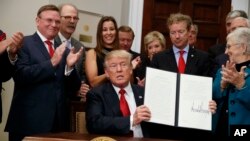U.S. President Donald Trump, frustrated by congressional failures to overhaul national health care policies, signed an executive order Thursday aimed at making lower-cost, reduced-benefit health insurance more readily accessible for consumers.
Trump staged a White House event with small-business owners who could benefit from his order. The White House says it is likely to encourage creation of an array of cheap insurance plans that do not have to comply with existing consumer protection and benefit rules mandating that certain types of medical care, including mental health treatment and delivery of babies, be included in insurance policies sold in the U.S.
The U.S. leader said his changes will end the "nightmare of Obamacare," the popular term for the Affordable Care Act that was former president Barack Obama's signature legislative achievement.
"You'll have such great prices for such great care," Trump declared. "People will have great, great health care. And when I say people, I mean by the millions and millions"
Kentucky Sen. Rand Paul, a longtime Obamacare critic, stood alongside Trump, calling his executive order "the biggest free market reform of health care in a generation."
The new policies could attract younger people and healthier people to buy individual insurance policies that, with more benefits, have proved too costly under Obamacare. But the changes could leave older and sicker Americans left to buy policies under Obamacare, with insurance companies likely imposing even higher insurance premiums.
Campaign pledge
Since he took office early this year, Trump pushed Republican lawmakers to live up to their seven-year vow to dismantle Obamacare. The House of Representatives narrowly voted to repeal the law in May, but Senate versions of the overhaul were twice defeated in recent months, with unified Democratic opposition and a handful of Republicans killing the legislation.
Trump has repeatedly attacked Republican lawmakers for failing to repeal and replace the national health care law and hopes with the executive order he can accomplish much the same. But some of the changes could take months to take effect, with federal agencies required to hold hearings and ask for comments from interested parties.
Critics point to downsides
Critics of Trump's order say that by allowing sale of the cheaper policies, the Obamacare insurance markets are likely over time to be undermined, with insurers dropping policies with a broad list of benefits. The new rules will allow the establishment of association health plans under which groups of small businesses would be allowed to band together to negotiate health care benefits for their employees, much like individual companies do now. The new policies could also ease the path for the purchase of short-term policies, which Obamacare limited to three months but Trump's order will likely extend to nearly a year.
The Trump changes are likely to chiefly affect about 8 million Americans who buy individual health care insurance policies and earn too much money to receive government subsidies that protect 9 million poorer people from insurance cost increases in the individual market. Those subsidies now look to be in danger.
In the U.S., half or more of the working population gets health insurance paid mostly by their employer with lesser contributions from the workers. Millions of older people, those older than 65, get 80 percent of their medical costs paid by the government. Disabled people also receive government health care benefits.
Obamacare was approved by Congress in 2010, but without a single Republican lawmaker voting for it. Under it, about 20 million people who previously had no health insurance to help pay their medical bills were able to gain coverage.
But Republican lawmakers intensely disliked it, viewing it as government overreach, especially a mandate for almost all Americans to buy health insurance coverage or pay a penalty if they did not, and have assailed the law because of the rising cost of insurance premiums. But they failed in dozens of attempts to repeal the law, even after the Republican Trump assumed office in January and Republicans controlled both chambers of Congress.
National polls in the U.S. have shown voters favored keeping Obamacare, not Republican plans to repeal it.





